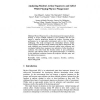Free Online Productivity Tools
i2Speak
i2Symbol
i2OCR
iTex2Img
iWeb2Print
iWeb2Shot
i2Type
iPdf2Split
iPdf2Merge
i2Bopomofo
i2Arabic
i2Style
i2Image
i2PDF
iLatex2Rtf
Sci2ools
AIED
2015
Springer
2015
Springer
Analyzing Student Action Sequences and Affect While Playing Physics Playground
Physics Playground is an educational game that supports physics learning. It accepts multiple solutions to most problems and does not impose a stepwise progression through the content. Assessing student performance in an open-ended environment such as this is therefore challenging. This study investigates the relationships between student action sequences and affect among students using Physics Playground. The study identified most frequently traversed student action sequences and investigated whether these sequences were indicative of either boredom or confusion. The study found that boredom relates to poor performance outcomes, and confusion relates to sub-optimal performance, as evidenced by the significant correlations between the respective affective states, and the student action sequences.
| Added | 14 Apr 2016 |
| Updated | 14 Apr 2016 |
| Type | Journal |
| Year | 2015 |
| Where | AIED |
| Authors | Juan Miguel L. Andres, Ma. Mercedes T. Rodrigo |
Comments (0)

